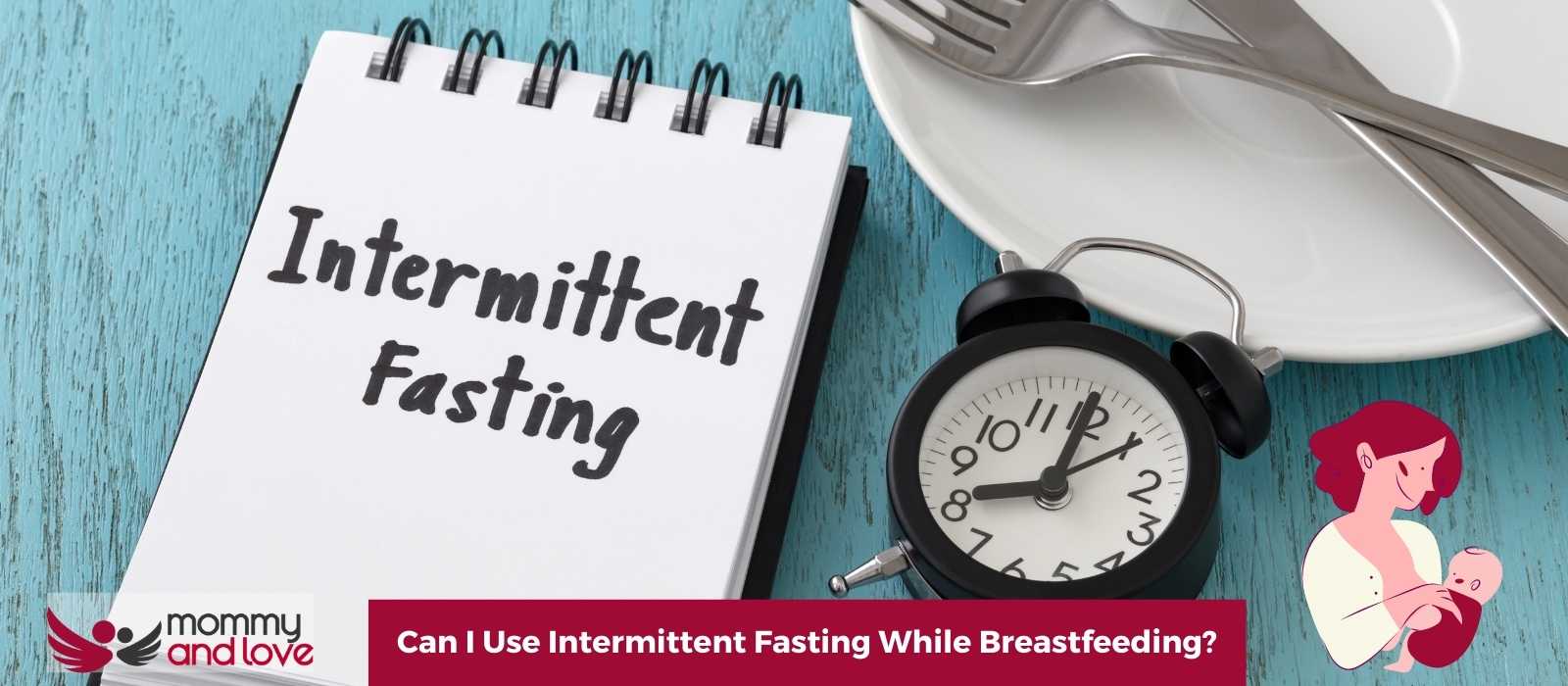One of the biggest advantages many moms attribute to breastfeeding is speedy post partum weight loss. However, every breastfeeding mother has her own body and metabolism, so, unfortunately, many breastfeeding mothers struggle to shift the baby weight.
If you’re looking for a way to lost that pregnancy weight, you may be asking yourself “Can I use intermittent fasting while breastfeeding?”
Lets take a look at what intermittent fasting is, if its safe, if it works, and what affects it may have on breastfeeding moms and their babies.
What Is Intermittent Fasting?

Intermittent fasting is where you restrict your eating to a pre set eating window.
Some people choose alternate day fasting, where they fast one day and enjoy a normal healthy diet the next, and then back to fasting and so on. Another option is to pick specific days of the week to eat.
Perhaps the most popular method is to have a set eating window each day; many people do the majority of their fasting during the night. For example, one might fast from 8pm to 12 noon each day, only eating food outside the fasting window.
This means of calorie restriction may sound harsh, but actually when done properly, peer reviewed studies suggest that intermittent fasting can actually have health benefits!
It is thought that intermittent fast might reduce inflammation in the body, as well as lowering cholesterol, blood pressure and blood sugar levels.
The idea behind intermittent fasting is that, not only will your body burn fat stores while in the fasting window, but you will also naturally consume fewer calories in your eating window.
What are the Benefits of Intermittent Fasting?
Intermittent fasting is meant to give your body time to rest in order for your digestive system to work efficiently to repair and metabolize food. The insulin and leptin receptors are also slowed down in these periods and the insulin receptor re-sensitize.
Intermittent fasting may help reduce hunger. Going extended periods without eating can train the stomach to adapt to a smaller intake of food.
Many men and women report positive experience with intermittent fasting in terms of reaching their weight loss goals, reporting a marked difference in their waist line.
One study saw a group of adults practice alternate day intermittent fasting and lost weight equivalent to 8% of their body weight in just 8 weeks.
Of course, with weight loss come the subsequent benefits of reduced risk of cardiovascular disease, improved self esteem and mental health, and reduced risks for some cancers.
Can Fasting While Breastfeeding be Dangerous for the Breastfeeding Mother?
Unfotunately, there is relatively little research about the safety of intermittent fasting while breastfeeding, either for breastfeeding moms own health or for the baby.
The common sense answer is that breastfeeding women certainly need to sure to drink lots and enough calories to meet their own nutritional needs, on top of protecting her milk supply too. Breastfeeding moms would need to take extra care to take in enough calories and healthy fats to sustain her through the fasting period.
We’ve written a great post about foods to eat after giving birth that may help you improve your diet.
It would be prudent to discuss intermittent fasting with a healthcare professional specialising in women’s health before proceeding. A full evaluation of the mom’s current nutritional status and body weight would be necessary to ensure that intermittent fasting while breastfeeding wouldn’t lead to deficiency.
We do have some anecdotal evidence from Muslim women who opt to fast during the month of Ramadan- some nursing women reported a small dip in breast milk supply.
The general advice is that lactating women do not fast, as the breastfeeding mother needs an additional 300-600 calories per day in order to sustain milk supply, particularly in the early months. Wev’ve wrote a guide on how you cannot survive on 1200 calories whilst lactating.
Another good option is to speak to a registered dietitian who can help you plan a diet with all of the nutrient content and enough fluids to sustain you, while also aiming to reduce calories to aid weight loss.
Is Intermittent Fasting Safe for the Baby?

Again, studies are scarce. Not enough is know about how fasting might affect breast milk quality or breast milk supply.
One study looking at breastfeeding women fasting over Ramadan found that breast milk production was not significantly impacted, however, the levels of some micronutrients seem to reduce during the fasting period.
The main concern then is that the breastfed baby may not get enough milk, or that they may miss out on calories or nutrition.
Speak to a medical professional, and if you get the go-ahead, be sure to watch out for these signs that intermittent fasting while breastfeeding might not be working out:
- a sleepy, lethargic baby
- slowed or static weight gain
- a reduction in wet or dirty diapers
- signs of dehydration; sunken fontanelle, dark urine, no tears
Will Rapid Weight Loss Affect Breast Milk Supply?
Additionally, milk quality is of concern. For the first 6 months or so, your baby relies exclusively on breast milk for healthy fats to assist them in gaining weight, as well as valuable nutrients such as vitamin d, iodine, iron and vitamin b-12. Your milk is their sole source of nutrition!
Therefore, many moms like to at least wait until their baby is established on solid foods to compliment their milk intake. A healthy diet during this period can help you stay healthy while getting adequete nutrition to support your own body, as well as preventing a decrease milk supply.
Should you experience any supply issues, we can help! Read all about natural ways to increase breast milk supply here.
The short answer is that not enough is known about intermittent fasting while breastfeeding. Any change of diet should be discussed with your doctor, who can evaluate any health risks to either your own body or to your baby.
Is There A Preferred Method of Intermittent Fasting for Women?
Limited research suggests that women may benefit from shorter periods of intermittent fasting than men, for example a window of 8-10 hours to eat each day.
It is important that you drink plenty and eat enough during your eating window
Intermittent Fasting While Breastfeeding: The Take Home Message
Just a few things to remember!
Intermittent fasting is associated with swift weight loss and is tempted for breastfeeding moms who often struggle so get rid of fat gain in pregnancy, even when they commence a healthy diet to reduce calories.
Our advice is that during the post partum period, your priority should be the health of your baby and yourself. Your body is already working hard to maintain a milk supply for your baby and female hormones are working on overdrive to look after you both- so give it a break!
We have written a great post about losing weight while breastfeeding if you want some general help and tips.
At this time, we simply do not know enough about intermittent fasting to give a definitive answer as to its safety for the nursing mom and baby- we recommend that you speak to your doctor before making any significant changes to your diet.

This article was written by Sandra Baker – full time writer and the mother of four amazing kids (including twins!)
She’s also a breastfeeding counselor and has spent years helping new parents learn how to care for their children. When she’s not writing or caring for her children, Sandra likes to spend time reading and taking walks with her husband.




